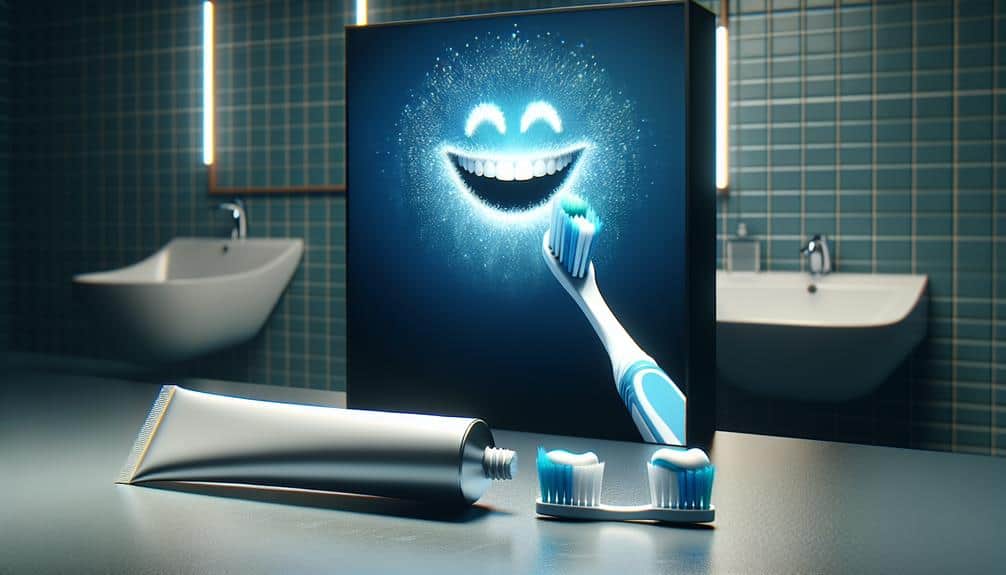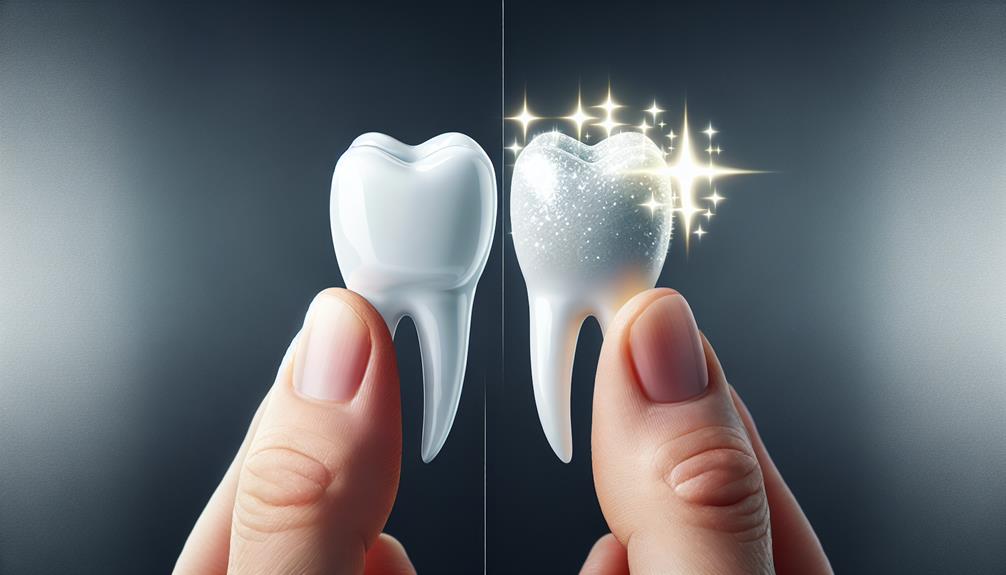When dealing with stubborn stained teeth, consider trying Charcoal Whitening Toothpaste, known for its ability to remove tough stains and its natural composition. Enamel-Safe Whitening Toothpaste, with enamel-strengthening ingredients like hydrogen peroxide, can gently remove stains while protecting your enamel. Additionally, Peroxide-Free Whitening Toothpaste offers a chemical-free brightening solution. Natural Whitening Toothpaste focuses on plant-based ingredients for a holistic approach. Sensitivity-Relief Whitening Toothpaste is designed for sensitive teeth.
For more options tailored to stubborn stains caused by coffee, tea, red wine, or smoking, explore Professional Strength and Advanced Whitening Toothpaste for deeper whitening penetration and long-lasting results.
Key Points
- Charcoal Whitening Toothpaste: Effective at removing tough stains, but potential enamel damage with daily use.
- Enamel-Safe Whitening Toothpaste: Gentle yet effective stain removal, focuses on enamel strengthening and preservation.
- Peroxide-Free Whitening Toothpaste: Brightens teeth without harsh chemicals, contains gentle stain-fighting ingredients.
- Natural Whitening Toothpaste: Harnesses plant-based ingredients, gentle on teeth and gums, suitable for sensitivity.
- Professional Strength Whitening Toothpaste: Maximum strength formula, targets stubborn stains, ADA-approved for safety and effectiveness.
Charcoal Whitening Toothpaste
If you're looking to tackle tough stains on your teeth, charcoal whitening toothpaste may be a game-changer for you. Charcoal toothpaste has gained popularity for its ability to remove stains through its abrasive properties. One of the benefits of charcoal toothpaste is its ability to absorb toxins and chemicals, which can help in removing surface stains on teeth effectively. However, it's essential to note that charcoal toothpaste may be too abrasive for daily use, leading to potential enamel damage and increased tooth sensitivity. Hence, it's recommended to use charcoal toothpaste in moderation to avoid these drawbacks.
When comparing charcoal toothpaste to traditional whitening products, it's crucial to note that charcoal toothpaste is generally more natural and doesn't contain harsh chemicals like traditional whitening agents do. However, traditional whitening toothpaste often contains ingredients like hydrogen peroxide that can penetrate the teeth to remove deeper stains. So, while charcoal toothpaste can be effective for mild surface stains, traditional whitening products may be more suitable for stubborn or deep-seated discoloration.
Enamel-Safe Whitening Toothpaste
When selecting whitening toothpaste for stained teeth, choosing an enamel-safe option is essential for maintaining the health of your teeth.
Enamel-safe whitening toothpaste provides a gentle yet effective way to remove stains without compromising the integrity of your enamel.
Look for ingredients like hydrogen peroxide or carbamide peroxide, which are known for their enamel-safe whitening properties.
Safe Enamel Protection
To guarantee the safe protection of your enamel while brightening your teeth, opt for a toothpaste specifically designed for enamel-friendly whitening. Look for toothpaste that focuses on enamel strengthening and stain prevention.
Enamel is the outer layer of your teeth that safeguards them from decay and damage. Enamel-safe whitening toothpaste helps preserve this protective layer while effectively removing stains. These toothpaste formulas typically contain ingredients like fluoride to fortify enamel and gently polish away stains without causing harm.
Gentle Whitening Action
For those looking to maintain enamel health while achieving a brighter smile, consider choosing an enamel-safe whitening toothpaste that offers gentle whitening action. When selecting a toothpaste for sensitive teeth that you can use daily, look for the following features:
- Low abrasiveness: Opt for a toothpaste with gentle abrasives that can effectively remove surface stains without causing damage to the enamel.
- Enamel-strengthening ingredients: Choose a toothpaste that contains fluoride to help strengthen and protect the enamel, reducing sensitivity over time.
- Mild whitening agents: Look for whitening toothpaste with mild whitening agents like hydrogen peroxide or baking soda that are effective yet gentle on sensitive teeth when used daily.
Peroxide-Free Whitening Toothpaste
Consider trying a peroxide-free whitening toothpaste to effectively brighten your smile without the use of harsh chemicals. While peroxide is a common ingredient in whitening toothpaste, peroxide-free alternatives can still provide excellent stain-fighting properties. These toothpastes often contain other potent stain-fighting ingredients like baking soda, activated charcoal, or silica, which are gentle on enamel yet effective in removing surface stains.
Peroxide alternatives such as baking soda work by creating a mild abrasive action that helps to scrub away stains without damaging the teeth. Activated charcoal is another popular ingredient known for its ability to absorb impurities, making it a great natural whitening agent. Silica, often derived from mineral sources, is also gentle on enamel and helps to polish away stains for a brighter smile.
When choosing a peroxide-free whitening toothpaste, look for products that have been clinically tested for their whitening efficacy. Remember to brush regularly and maintain good oral hygiene habits for the best results.
Natural Whitening Toothpaste
To explore a more natural approach to whitening your teeth, consider opting for a natural whitening toothpaste that harnesses the power of plant-based ingredients for a brighter smile. Natural whitening toothpaste often incorporates gentle yet effective natural ingredients that can help remove surface stains and promote a whiter smile without the use of harsh chemicals. Here are three reasons why natural whitening toothpaste might be the right choice for you:
- Natural Ingredients: Natural whitening toothpaste typically contains ingredients like baking soda, activated charcoal, and coconut oil, which are known for their stain-fighting properties. These natural ingredients can help brighten your smile without causing damage to your enamel.
- DIY Remedies: Many natural whitening toothpaste options offer a more holistic approach to oral care, allowing you to take control of what you put in your mouth. DIY remedies using ingredients like turmeric or hydrogen peroxide can also be effective in gently whitening teeth over time.
- Gentle on Teeth: Natural whitening toothpaste is often gentler on teeth and gums, making it a suitable option for those with sensitivity. By avoiding harsh chemicals, you can achieve a whiter smile without compromising your oral health.
Sensitivity-Relief Whitening Toothpaste
If you experience tooth sensitivity but still want to whiten your teeth, sensitivity-relief whitening toothpaste could be the solution you're looking for.
These toothpaste formulas are designed with sensitivity relief technology to provide a gentle whitening experience without compromising enamel.
Sensitivity Relief Technology
When selecting a whitening toothpaste for stained teeth, look for one that incorporates advanced Sensitivity Relief Technology to address tooth sensitivity while also providing effective whitening benefits. Here are key features to take into account:
- Sensitivity Management: Opt for a toothpaste with an advanced formula designed to specifically target and alleviate tooth sensitivity.
- Relief Technology: Seek out a toothpaste that offers relief technology to help reduce sensitivity and protect enamel from further damage.
- Enamel Protection: Choose a toothpaste that not only whitens but also strengthens enamel, providing a protective barrier against sensitivity triggers.
Choosing a toothpaste with these qualities ensures that you aren't only tackling stubborn stains but also actively managing tooth sensitivity for overall oral health.
Gentle on Enamel
For a whitening toothpaste that's gentle on enamel and provides sensitivity relief, consider incorporating advanced technology that targets both concerns simultaneously.
Look for toothpaste formulas that focus on enamel strengthening and stain prevention. Enamel-strengthening ingredients like fluoride and hydroxyapatite can help protect your teeth from sensitivity while fortifying the enamel. Additionally, components such as potassium nitrate or arginine can aid in sensitivity relief by soothing the nerves inside the teeth.
Effective Stain Removal
To effectively combat stubborn stains on your teeth while providing relief for sensitivity, opt for a whitening toothpaste that excels in effective stain removal and sensitivity relief.
When seeking effective stain removal, look for toothpaste containing ingredients like hydrogen peroxide, baking soda, and activated charcoal. These components work to break down and remove surface stains, revealing a brighter smile.
Additionally, consider implementing stain prevention techniques such as reducing consumption of staining foods and drinks, and practicing good oral hygiene habits. DIY stain removal methods like oil pulling or baking soda paste can also aid in reducing stains when used in conjunction with a whitening toothpaste.
Choose a whitening toothpaste known for its effectiveness in removing tough stains for a dazzling smile.
Professional Strength Whitening Toothpaste
Consider choosing a professional grade whitening toothpaste to effectively address tough stains on your teeth. These toothpaste products are crafted with a maximum strength formula designed to provide professional whitening outcomes in the convenience of your own home. Professional grade whitening toothpaste typically contains higher concentrations of whitening agents such as hydrogen peroxide or carbamide peroxide compared to regular whitening toothpaste.
The heightened levels of these active ingredients enable professional grade whitening toothpaste to penetrate deeper into the enamel, targeting stubborn stains caused by coffee, tea, red wine, or smoking. By using a professional grade whitening toothpaste consistently as part of your oral care routine, you may start to notice visible results in the brightness of your smile.
When choosing a professional grade whitening toothpaste, look for products that are ADA-approved to ensure their safety and effectiveness. Remember to follow the instructions provided by the manufacturer to achieve the best results while minimizing the risk of sensitivity.
Advanced Whitening Toothpaste
When seeking to enhance the whitening effects on your teeth, explore the benefits of using an advanced whitening toothpaste with innovative formulations. These toothpastes are designed to provide deep cleaning and deliver long-lasting results.
Here are three key features to look for in advanced whitening toothpaste:
- Microcrystals for Enhanced Whitening: Advanced whitening toothpaste often contains microcrystals that can reach into the tiny crevices of your teeth, effectively removing stubborn stains and discoloration that regular toothpaste may miss.
- Active Ingredients for Deep Cleaning: Look for toothpaste with active ingredients like hydrogen peroxide or baking soda, which can penetrate the enamel to break down stains and provide a deeper clean than traditional toothpaste.
- Extended Whitening Protection: Advanced whitening toothpaste offers long-lasting results by creating a protective barrier on your teeth that helps prevent future stains from setting in, keeping your smile bright and white for an extended period.
Choose an advanced whitening toothpaste to experience superior whitening effects that go beyond surface cleaning and provide a lasting brightness to your smile.
Frequently Asked Questions
Can Whitening Toothpaste Harm Dental Restorations or Dental Work?
Using whitening toothpaste on dental restorations requires precautions. Such products can harm restorations by wearing them down. To protect enamel and avoid damage, consult with your dentist for recommendations tailored to your specific dental work.
Are There Any Potential Side Effects or Risks Associated With Using Whitening Toothpaste?
Using whitening toothpaste may lead to potential risks like tooth sensitivity or gum irritation. Despite this, the benefits include improved aesthetics. Long term effects and efficacy vary among individuals. Consult your dentist for personalized advice.
How Long Does It Typically Take to See Noticeable Results From Using Whitening Toothpaste?
To see noticeable results from whitening toothpaste, proper application technique is essential. Consistent use, typically twice daily, can lead to improved effectiveness. Results vary, but many users report visible changes in tooth shade within a few weeks.
Can Whitening Toothpaste Help With Deep-Set Stains or Discoloration?
Whitening toothpaste can be effective for surface stains but may not fully address deep-set discoloration. Professional treatments offer more noticeable results. Natural and home remedies might help mildly, but for stubborn stains, consult a dentist for tailored solutions.
Are There Any Specific Ingredients to Avoid in Whitening Toothpaste for Individuals With Sensitive Teeth or Allergies?
When choosing whitening toothpaste for sensitive teeth or allergies, watch out for harsh chemicals like peroxide that can exacerbate sensitivity. Opt for gentle formulations with fluoride and potassium nitrate for effective whitening without irritation.
Conclusion
To wrap up, when it comes to stubborn stained teeth, selecting the right whitening toothpaste can make all the difference. Just like a gentle breeze lifting away stubborn stains, these 7 top whitening toothpastes offer a variety of options to suit your needs.
From charcoal to enamel-safe formulas, there's a solution for everyone. So, bid farewell to stubborn stains and welcome a brighter, whiter smile with these top whitening toothpastes.



